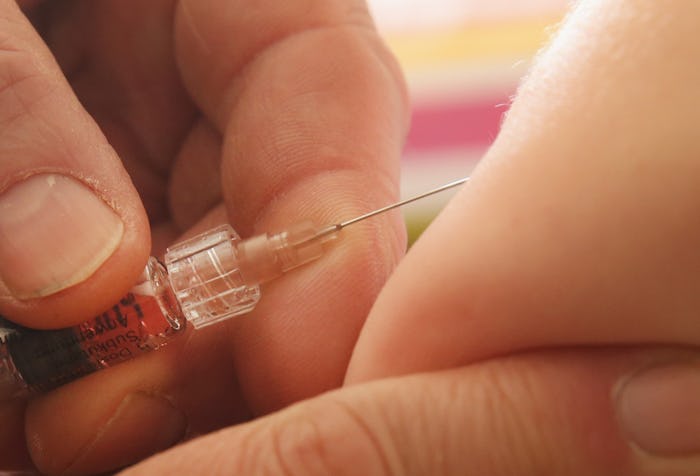Life

Why You Shouldn't Worry About Mercury In Vaccines
While the age of the internet can be considered a boon for scientific understanding — we've got all the information in the world right at our fingertips, after all — it's sometimes an obstacle, too, because it also serves up all the world's misinformation, and some people have a hard time sorting out the truth from the lies. Internet falsehoods could make new parents nervous about immunizations, but there are a number of reasons why you shouldn't worry about mercury in vaccines, the first of which is that there basically isn't any these days.
Let's back up. The anti-vaxxer movement was spurred by Andrew Wakefield, whose published a fraudulent study full of falsified data for profit. His study is still the only "evidence" that vaccines caused autism, because they do not. Wakefield was eventually exposed and stripped of his medical license, but he stuck to his story, and he's still gaining followers nearly 20 years later. He claimed that autism was caused by thimerosal, a vaccine preservative that contains ethylmercury. A subsequent FDA investigation found "no evidence of harm caused by doses of thimerosal in vaccines," but due to an abundance of caution (and the rise of noisy internet kooks) thimerosal was phased out of childhood vaccines by 2001.
Thimerosal is still used in multi-dose vials of flu shots and some tetanus shots for adults, because repeatedly puncturing the same vial can introduce bacteria and fungi. Patients who have a problem with thimerosal can request a single-dose vial instead, but it's really not necessary. Thimerosal is a derivative of ethyl mercury, not the methyl mercury that we know to be toxic. How big of a difference can one letter make? Well, take ethyl alcohol and methyl alcohol for example. One makes beer, and the other, antifreeze. The vaccines that do still use thimerosal contain no more than 50 micrograms of ethyl mercury per dose, and that gets excreted by the body in less than a week. By comparison, a can of tuna contains the same amount of methyl mercury (that's the bad one), which accumulates in the body rather than being excreted, and both the FDA and EPA recommend that children and pregnant women eat that two to three times a week.
Sadly, the anti-vaxxers either can't understand the facts, or just refuse to listen to them, and now, they're using new tactics to attempt to legitimize their movement. A recent propaganda article advocated using doublespeak when discussing their position, like swapping the term anti-vaxxer for "vaccine safety advocate," referring to vaccine preventable diseases as "vaccine related diseases" (huh?), and even rechristening unvaccinated children as kids with "intact immune systems" (LOLWUT). This is incredibly dangerous. But you know what? Don't believe me. I can't tell you that some random woman on the internet isn't a credible source while simultaneously claiming that I, another random internet woman, somehow am. So click through the links above and see what the NIH, CDC, FDA, and WHO have to say about it. Don't trust them? Ask a doctor! Make an appointment with a licensed pediatrician (or five) and see what they have to say. They'll tell you that vaccines are safe and necessary, and mercury is of absolutely no concern. One less thing to worry about.